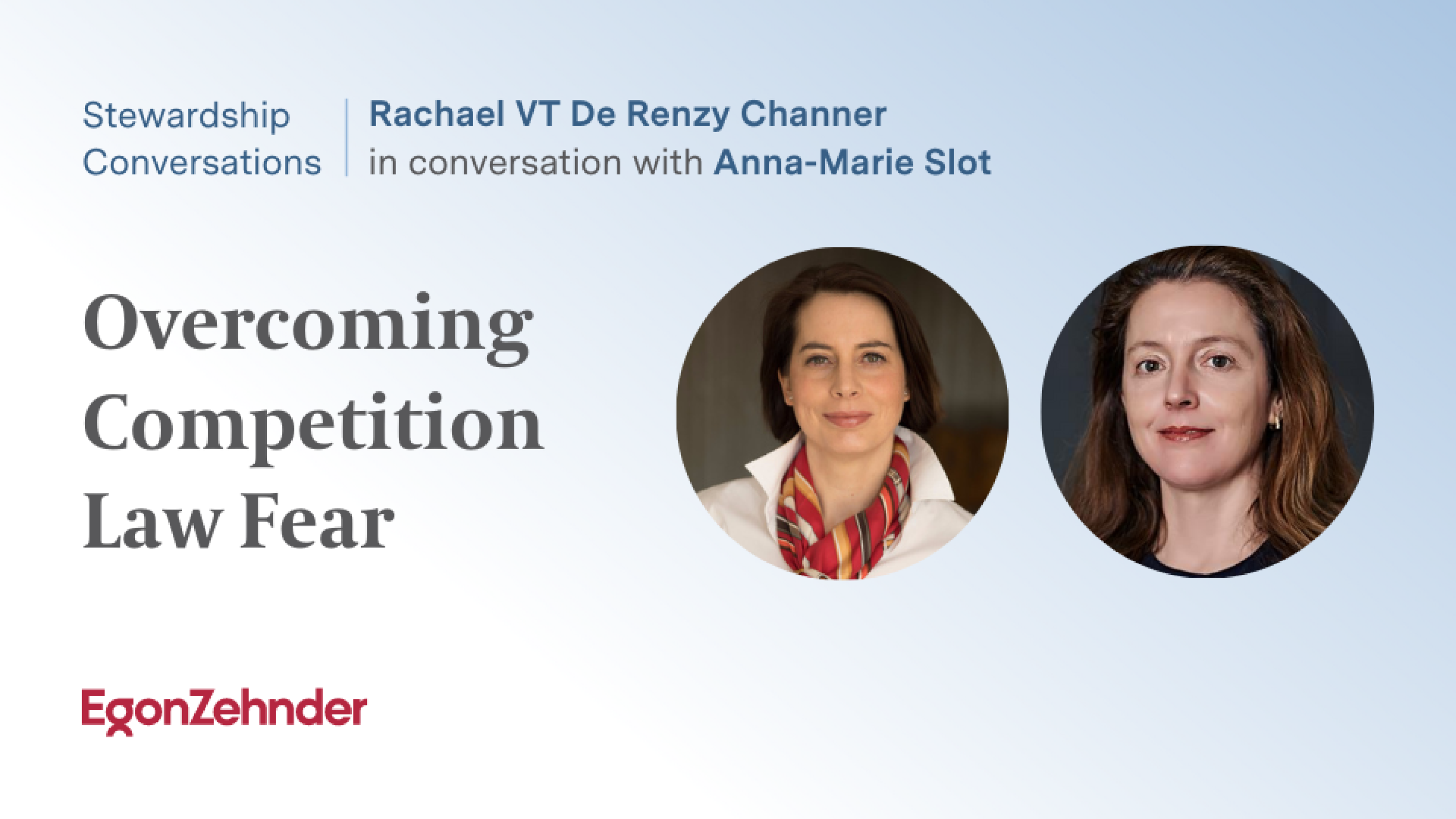In every global transaction, there’s a common denominator few people are thinking about—the lawyer. When we consider sustainability, and as the need for urgent action becomes increasingly apparent, we should draw comfort from these legal professionals. They hold the key to navigating the complex landscape of sustainability transitions – and transactions, catalyzing the change within a web of commercial frameworks.
In this edition of Stewardship Conversations, I had the privilege of interviewing Anna-Marie Slot. During the conversation, she challenges us to embrace lawyers as catalysts for alleviating the fear many companies and organizations feel when innovating in response to climate challenges. She urges both collaboration and action from companies and governments. As she states, "We need to stop iterating and just start moving."
Read on for the conversation highlights:
What sparked your interest in sustainability?
I read Rachel Carson's “Silent Spring” when I was quite young. The book explores the idea of what impact we have on the natural world and what we can do about it. As I learned more, and science came to light with the IPCC report, the International Energy Agency report, I thought: ‘We really need to shift how we do things, and quickly.’ By 2014, I was doing deals in green finance when ICMA released their principles, and by 2019, I had created the position of global ESG partner. It was kind of an evolution. As I moved through my career, I felt a greater ability to be impactful. This comes with a great responsibility.
How would you define your purpose?
For me, it is really about using my skills, my capabilities, my experience, to really drive action around transition.
What are the key topics that legal professionals tackle when they are in the C-suite or advising clients?
Lawyers are increasingly involved in working with their clients in discussions on materiality amidst growing regulations and sustainability concerns. Lawyers have this huge wealth of market information, having done 20 or 30 transactions in a year; they are at the nexus of risk and opportunity. One of their key skills is thinking critically. In the context of sustainability, this means thinking about risk and about how transactions are being structured, assets are being used, the public positions a company is taking, and their strategy.
Are you seeing Boards change their approach to transition to a more stakeholder outlook?
There's a natural conservative tendency in interpreting the law. When you think about board membership and fiduciary duty, which is never clearly defined, it underscores the importance of being informed and anticipating company challenges. Now, with resources like the IPCC reports readily available, the focus shifts to utilizing such information effectively. It's more beneficial to consider this evolution than to dwell on minor details or debates.
What kind of experts do you need on the Board?
Boards constantly go through waves of reassessing their expertise needs. Whether it's digital, IT, or transition expertise, they seek the necessary skills. While you don't need a multitude of board members for every function, having individuals who can provide informed insights on risks and opportunities is vital. It is about finding enough expertise and those who can really help boards inform themselves so that they can then bring sustainability into their considerations.
How might competition law be enabling or holding people back?
Fear often comes from a lack of understanding of what you are trying to do. Companies have always joined trade associations and gone into joint ventures with industry partners which don't run afoul of competition law. This is where companies need to engage with their General Counsels to understand what constitutes acceptable collaboration and where the risks lie. There's a lot of good collaboration where people stay within these boundaries. When all parties are on board with that, all company GCs are aligned, that's where the fear goes away.
Have you seen good practice of communication/collaboration between government, corporates and civil society?
We’re at a point where everybody has realized we need to shift action. No one is moving fast enough. Companies can do a whole lot on their own in driving demand and providing supply. Look at energy security, for example. Business is ready to get involved and deliver. The planning aspect of a transition plan is somewhere where businesses can really start dedicating to what does this look like for us and putting the capex in the right. I think investors also playa huge role. And governments do have to help, but they are never going to be the first mover. Companies move much faster than government. Government is essentially the critical mile to create enabling environments for transition.
How do governments move the needle?
The European Union takes one approach, the United States takes a different approach. And the other player is the consumer. The real last dial is the consumer/employee choice.
How do legal professionals with their training and professional standards adapt to complexity and these new challenges as leaders?
Lawyers prefer areas where there's clear understanding. However, despite our aversion to uncertainty, the legal landscape is rapidly changing with numerous regulations emerging. Legal professionals are adapting to these changes, striving to comprehend new laws and their implications to advise clients effectively. Just as with past legislation like Sarbanes-Oxley, lawyers don't shy away; instead, they interpret, establish best practices, and evolve their understanding over time. While lawyers may not embrace ambiguity, they excel at applying new regulations to client situations, identifying risks, and offering guidance.
The Net Zero Lawyers Alliance seems quite a radical name for a group of lawyers. Can you tell me a little bit about that?
Though it may sound radical, the Net Zero Lawyers Alliance is actually a UN Net Zero accelerator. It focuses on upskilling private practice lawyers in key climate-related areas. This includes understanding the climate transition implications in various legal services. For instance, tax lawyers now need to grasp concepts like the EU's CBAM mechanism. The Alliance also houses accelerator groups addressing issues critical to the transition, such as competition law. Through collaboration among leading law firms, these groups establish common interpretations and frameworks, streamlining advice for general counsels. This collective effort aids in navigating complex legal landscapes related to climate action.
Could you talk about the requirement for a transition plan that exists in some places?
Thousands of companies have committed to net zero, outlining reductions by 2030 and 2050, based on science. Transition plans detail the pathway to achieve these goals, bridging the gap between commitment and action. They provide a framework for companies to consider practical steps, such as enhancing energy efficiency. Transition plans are crucial for accountability and leadership in addressing uncertainties. Early adopters like NatWest have already developed comprehensive plans, setting a precedent for disclosure and commitment. As companies progress, the uncertainties in their plans should diminish, given the urgency of achieving goals by 2030.
What inspires you for the future?
People have enormous ingenuity, and when it really starts to matter, people come together. Think about the space race—that's the focus people need to have. Show me the art of the possible! It really opens up natural ingenuity that people have. Overall, people want to get stuff done, and the more things crystallize as we transition, the more we will see ingenuity around it.
***
Anna-Marie articulated that lawyers possess a multifaceted skillset that often goes unnoticed in the context of sustainability. What struck me most in chatting with Anna-Marie was the transformative potential lawyers hold. Instead of viewing these legal professionals solely as gatekeepers who may delay progress by imposing barriers and complications, we should recognize their capacity to facilitate innovation, particularly in addressing pressing issues like climate change. It was a welcome a perspective shift that's both surprising and remarkably inspiring to see how they can be agents of change, shaping norms and behaviors to enable new forms of collaborative effort.








